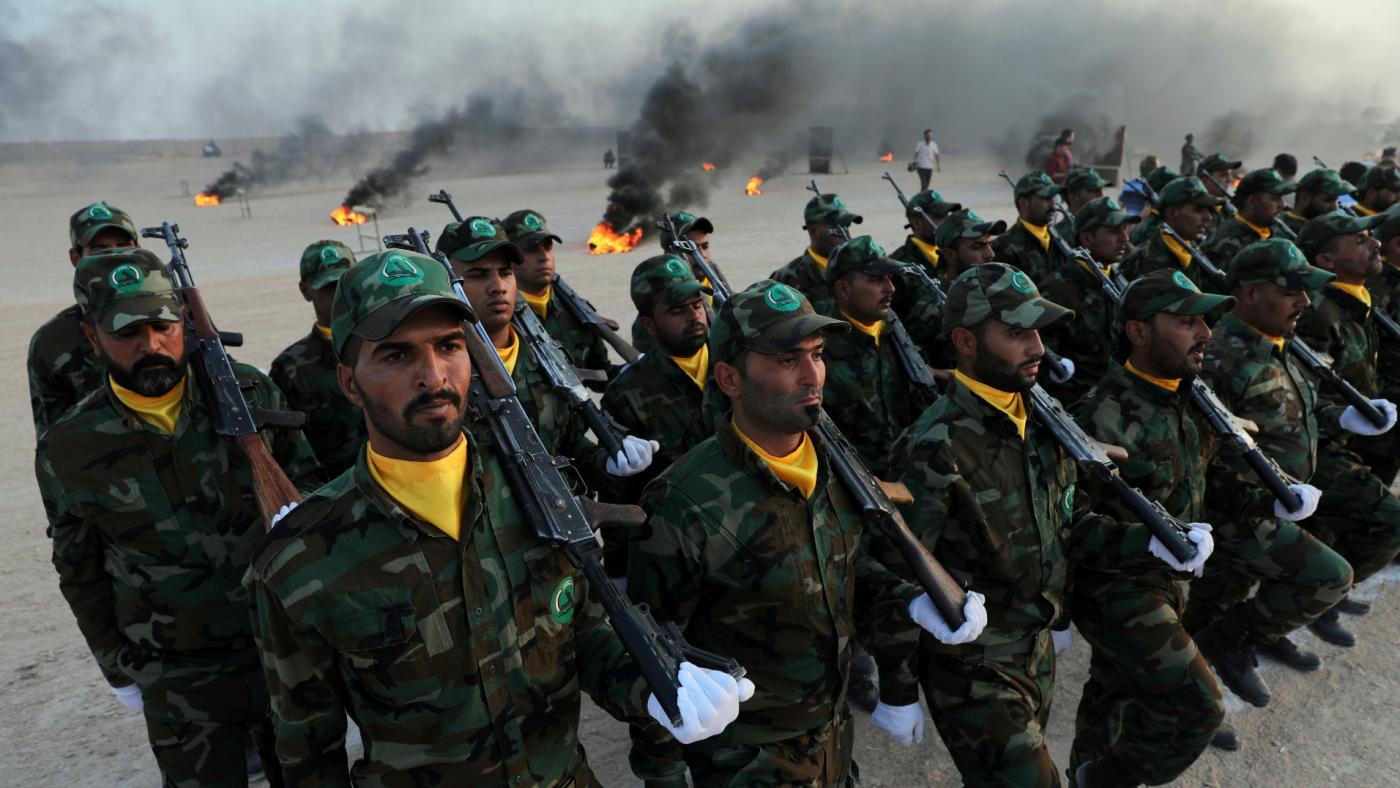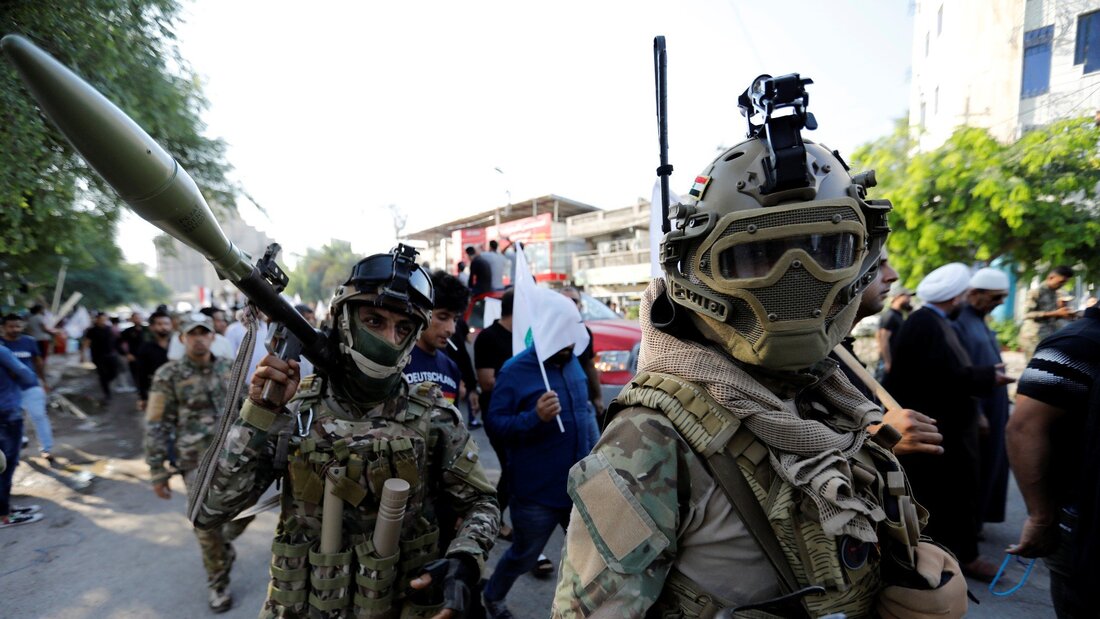The proposed 2023 budget, which the government submitted to parliament last month and has been reviewed by MEE, shows the Hashd is about half the size of the regular military. Security forces under the interior ministry are about three times the size of the paramilitary.
If passed, the new budget would give Hashd al-Shaabi 3.56 trillion Iraqi dinars ($2.7bn).
The significant increase in Hashd al-Shaabi fighters over just two years, as well as the large budget allocated to the force, raises many questions about the nature of the role it will play in the next few years.
Hashd al-Shaabi, also known as the Popular Mobilisation, was established in June 2014 to unite armed factions and volunteers to fight against the Islamic State group. It is led by the Popular Mobilisation Authority (PMA), a governmental umbrella that oversees the various groups’ activities.
Although these forces have become part of the Iraqi military since 2016 and are funded entirely by the government, most are not subject to the orders of the army commander-in-chief and some are accused of being involved in major human rights violations.
MEE has obtained appendices to the 2021 budget and 2023 draft budget, which are reserved for members of the government and parliament. These show the number of people on the state payroll.
They record that over two years, the ranks of the Hashd swelled by 116,000 fighters, now standing at 238,000 overall.
In comparison, the number of soldiers and other employees in the defence ministry grew by just 25,000 over the same period, up to 450,000 people. Similarly, the interior ministry’s numbers grew no more than 22,250, to over 700,000 overall.
However, it is not certain that these numbers accurately reflect the true number of personnel. The Hashd and other wings of the security forces have been suspected of inflating the number of people in their ranks to siphon off state funds for other uses.
Though interior ministry security forces outnumber the regular military and the Hashd, the majority are non-combatant civil and policing units, Iraqi military commanders and security officials told MEE.
Some security officials noted that there are discussions about altering the responsibilities of the federal police, where the Hashd would instead take on its armed response role - which may explain the large increase in paramilitary fighters.
A prominent security official told MEE that, “whether we like it or not”, the Hashd is in effect the military wing of the Coordination Framework, a Shia political alliance that dominates Prime Minister Mohammed Shia' al-Sudani’s government.
"It is natural that they seek to strengthen this wing financially and in personnel whenever the opportunity arises," the official said.
"Since the current parliament and government are almost completely under the control of the Coordination Framework, this increase seems reasonable and justified, given the necessary legal cover is available.”
It would be the largest budget Iraq has ever had, and if adopted would be used as the template for 2024 and 2025.
“The amounts proposed in this budget are very large and exceed the previous budget [in 2021] by 400 percent, but unfortunately they only cover the actual needs of ministries and government institutions by 10 percent,” Jamal Cougar, a member of Iraq's Parliamentary Finance Committee, told MEE.
Infrastructure of government services has decayed badly, and there is a serious shortage of supplies and equipment in many departments. Yet Cougar says this is not addressed in the draft budget.
"We need a five-year or 10-year plan to confront this destruction," he said.
Despite this apparent precariousness, MPs said, another 829,000 public sector jobs are set to be created and the social welfare network is also going to be expanded to include an extra million Iraqis.
"These appointments are part of the security-buying policy adopted by Sudani's government from day one. Sudani wants to avoid demonstrations and achieve temporary and rapid stability," a senior security official told MEE.
“Despite the seriousness of the repercussions of this policy and the shortness of its impact in a country like Iraq, which suffers from having too many public employees and an absence of strategic planning, no one denies that this policy buys loyalty, calm and time,” he added.
"Sudani desperately needs these three factors during the first year of his government, at least."
Based on last year's revenues, expected oil revenues for 2023 stand at $89.53bn (assuming a daily export rate of 3.5m barrels at $70 each).
Any decline in global oil prices or a decrease in export rates will inevitably be reflected in Iraq’s revenues.
“The proceeds from the sale of crude oil represent more than 90 percent of the budget’s financing, and this is a major source of concern and one of the problems that we will be unable to deal with in 2024 and 2025, not now,” Cougar told MEE.
“All studies indicate that oil prices will decline next year, and that the current price hike is temporary and caused by the Russian-Ukrainian war and the continuous reduction of production by Opec and Opec+.”
Cougar said the draft budget had no proposals to overcome a drop in revenues, and is devoid of administrative reforms or the creation of jobs that are actually useful to Iraq, rather than patronage vehicles.
"Nevertheless, the budget will pass and it will certainly be voted on,” he added, noting that local elections are due in a few months and all parties will need funds released to run their campaigns.



 RSS Feed
RSS Feed